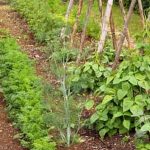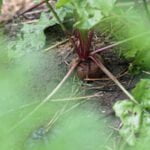What flowers help vegetable gardens? Incorporating flowers into a vegetable garden can offer a range of benefits, from attracting pollinators to repelling pests and improving soil health. Companion planting with flowers has long been practiced as a natural and effective way to enhance the growth and productivity of vegetables.
In this article, we will explore the various ways in which flowers can assist in the success of your vegetable garden. From attracting beneficial insects to controlling weeds, we will delve into the different roles that flowers can play in creating a thriving and productive vegetable garden.
Flowers not only add beauty to a vegetable garden but also serve important functions that contribute to its overall health. By choosing the right flowers, gardeners can attract pollinators such as bees, butterflies, and other beneficial insects that are essential for the successful pollination of vegetables. Additionally, certain flowers have pest-repellent properties that can protect vegetables from common pests while others help improve soil fertility and structure.
In this article, we will discuss the best flowers for attracting pollinators and explore their benefits to vegetable gardens. We will also look at flowers with pest-repellent properties and their role in protecting vegetable plants.
Furthermore, we will examine how specific flowers aid in soil improvement and discuss companion planting arrangements for successful integration of flowers into vegetable gardens. By understanding these various aspects, readers can gain insight into how to effectively incorporate flowers into their own vegetable gardens for enhanced overall productivity.
The Best Flowers for Attracting Pollinators
One of the most important roles that flowers play in vegetable gardens is attracting pollinators. Without pollinators, such as bees, butterflies, and hummingbirds, many vegetable plants would struggle to produce fruits and seeds. Some of the top flowers for attracting pollinators include bee balm, lavender, sunflowers, and cosmos. These flowers offer a rich source of nectar and pollen, making them irresistible to beneficial insects and birds.
Pollinators benefit vegetable gardens by ensuring the successful fertilization of crops like tomatoes, squash, cucumbers, and peppers. Their activity also contributes to genetic diversity within plant populations, which can lead to stronger and more resilient vegetable varieties. By planting an assortment of pollinator-attracting flowers alongside your vegetables, you can create a welcoming environment that supports these crucial insect and bird populations.
Incorporating pollinator-friendly flowers into your garden not only benefits the health and productivity of your vegetables but also helps maintain the overall balance of your local ecosystem. By encouraging the presence of bees, butterflies, and other beneficial insects through attractive flower choices like zinnias or coneflowers, you contribute to a thriving natural landscape that goes beyond the boundaries of your own yard.
| Flower | Attracted Pollinators |
|---|---|
| Bee Balm | Bees |
| Lavender | Butterflies |
| Sunflowers | Bees |
| Cosmos | Butterflies |
Flowers With Pest-Repellent Properties
Many flowers have natural pest-repellent properties that can help protect and improve the health of vegetable plants. Marigolds, for example, are known to repel nematodes, aphids, and other common garden pests. Their strong scent is unappealing to these insects, making them an excellent companion plant for vegetables such as tomatoes, peppers, and eggplants.
Another flower with pest-repellent properties is the nasturtium. Nasturtiums can deter a variety of pests, including whiteflies and cucumber beetles. Additionally, their edible leaves and flowers make them a versatile addition to a vegetable garden, providing both protection from pests and an attractive garnish or salad ingredient.
Incorporating these pest-repellent flowers into a vegetable garden not only helps reduce the reliance on chemical pesticides but also promotes a healthier gardening ecosystem. By naturally deterring pests, these flowers contribute to the overall well-being of the plants in the garden while also adding beauty and diversity to the space.
| Flower | Pest Repelled |
|---|---|
| Marigolds | Nematodes, aphids |
| Nasturtium | Whiteflies, cucumber beetles |
Flowers for Soil Improvement
When it comes to growing healthy and productive vegetables, the health of the soil is crucial. Flowers can be essential allies in improving soil health and fertility in vegetable gardens. Some flowers have unique properties that aid in soil improvement, making them valuable additions to any garden. Here are some flowers that can help improve the quality of your garden soil:
- Marigolds: These bright and cheerful flowers not only add color to your garden but also help to suppress nematodes in the soil, which can damage vegetable roots.
- Lavender: Known for its delightful fragrance, lavender also has antimicrobial properties that can contribute to overall soil health.
- Clover: This ground cover flower helps to fix nitrogen in the soil, making it more available for vegetable plants. It also acts as a natural mulch, conserving moisture and preventing erosion.
The presence of these flowers in the vegetable garden not only adds aesthetic appeal but also contributes to the long-term health and fertility of the soil. Improved soil structure, increased microbial activity, and better nutrient availability are just some of the benefits that these flowers bring to a vegetable garden.
By planting a variety of these soil-improving flowers throughout your vegetable garden, you can create a more balanced ecosystem where both vegetables and beneficial microorganisms thrive. The result will be healthier plants with higher yields, making the integration of these flowers into your gardening practices well worth the effort.
Companion Planting With Flowers
When it comes to companion planting in vegetable gardens, flowers can play a crucial role in promoting the health and productivity of the plants. By strategically incorporating flowers into vegetable garden layouts, gardeners can benefit from improved pollination, pest control, soil health, and weed suppression. Additionally, certain flowers serve as excellent companions to specific vegetables, enhancing their growth and overall yield.
Below are some examples of successful companion planting arrangements in vegetable gardens:
- Marigolds: These vibrant flowers are known for their pest-repellent properties, particularly against nematodes and aphids. Planting marigolds alongside tomatoes, peppers, and potatoes can help protect these vegetables from common pests.
- Nasturtiums: With their bright blooms and peppery leaves, nasturtiums attract beneficial insects such as predatory bugs and parasitic wasps. These insects can help control pests like aphids and caterpillars that may damage cabbage, kale, and other brassicas.
- Sunflowers: Tall and striking, sunflowers attract a variety of pollinators such as bees and butterflies with their abundant nectar. Planting sunflowers near cucumbers, squash, and melons can enhance pollination and ultimately lead to better fruit production.
By selecting the right flowers to accompany specific vegetables in the garden, gardeners can create a harmonious ecosystem that supports the well-being of all plants involved. As a result, integrating flowers into vegetable gardens through companion planting can contribute to a more balanced and sustainable approach to cultivation.
Seasonal Flowers for Year-Round Support
When planning a vegetable garden, it’s essential to consider the seasonal support that flowers can provide. Different flowers bloom at different times of the year, and selecting a variety of plants can ensure that your garden receives support throughout all seasons.
Spring Flowers
In the spring, planting flowers like daffodils, tulips, and hyacinths can attract early pollinators to your garden. These flowers also add vibrant colors and fragrances to your outdoor space, creating a cheerful environment for both you and the pollinators.
Summer Flowers
During the summer months, sunflowers, zinnias, and marigolds are excellent choices for attracting bees and other beneficial insects to your vegetable garden. These flowers provide nectar and pollen while adding beauty to your garden landscape.
Fall Flowers
To extend support into the fall season, consider planting asters or goldenrod. These late-blooming flowers are valuable food sources for migrating butterflies and other pollinators as they prepare for winter.
By integrating seasonal flowers into your vegetable garden, you can ensure a consistent source of support for pollinators throughout the year. This approach not only benefits your vegetables but also creates a visually appealing and biodiverse garden space.
Flowers for Natural Weed Control
Flowers can serve a dual purpose in vegetable gardens by not only adding beauty but also providing natural weed control. Certain flowers have the ability to naturally suppress weeds, making them valuable additions to any garden.
Examination of Flowers That Naturally Suppress Weeds
Some flowers, such as marigolds, sunflowers, and nasturtiums, release chemicals into the soil that inhibit the growth of weeds. Marigolds, for example, produce a substance called alpha-terthienyl that is toxic to certain soil-borne nematodes and suppresses weed growth. Sunflowers have allelopathic properties that hinder the germination and growth of weed seeds. Nasturtiums not only add a pop of color to the garden but also release chemicals that deter pests and inhibit weed growth.
How These Flowers Can Reduce Traditional Weed Control Methods
By incorporating these natural weed-suppressing flowers into vegetable gardens, gardeners can reduce their reliance on traditional weed control methods such as herbicides or manual weeding. This not only saves time and effort but also aligns with organic gardening practices by minimizing the use of synthetic chemicals in the garden.
Tips for Integrating Weed-Suppressing Flowers Into Vegetable Gardens
When integrating flowers for natural weed control, it’s important to strategically plant them throughout the garden beds. Planting them around the perimeter or interspersed among vegetable plants can help create a barrier against invasive weeds. Additionally, choosing a variety of natural weed-suppressing flowers with different blooming times can ensure continuous coverage throughout the growing season.
Overall, incorporating flowers with natural weed-suppressing properties into vegetable gardens is a sustainable way to maintain a healthy and productive garden while promoting biodiversity. By using these flowers as part of an integrated pest management approach, gardeners can effectively minimize weed competition and improve overall soil health in their vegetable gardens.
Tips for Integrating Flowers Into Vegetable Gardens
Integrating flowers into vegetable gardens can greatly enhance the overall health and productivity of the garden. However, it is important to carefully plan and consider the best ways to add flowers to your existing vegetable garden layout.
One practical tip for integrating flowers into vegetable gardens is to create designated flower beds or borders within or around the garden. This can help prevent competition for resources between the flowers and vegetables while also allowing you to incorporate a variety of different flower species.
Another tip is to select flowers that are compatible with the specific needs of your vegetable plants. For example, if you have a lot of root vegetables in your garden, choosing flowers that improve soil health and fertility, such as marigolds or sunflowers, can be beneficial.
Additionally, consider the height and growth habits of both your vegetables and flowers when integrating them into the same garden space. Taller flowers like hollyhocks or cosmos can provide support for climbing vegetables like beans or peas.
One potential challenge when integrating flowers into vegetable gardens is managing pests that may be attracted to the additional vegetation. To overcome this challenge, it is important to select pest-repellent flowers that can help protect both the flowers and vegetables in your garden.
Additionally, maintaining good gardening practices such as proper spacing between plants, regular watering, and adequate sunlight can also help mitigate any potential issues when integrating flowers into your vegetable garden. By considering these tips and addressing potential challenges, you can successfully integrate flowers into your vegetable garden and enjoy their many benefits.
Conclusion
In conclusion, the integration of flowers into vegetable gardens can provide a wide array of benefits. From attracting pollinators and repelling pests to improving soil health and providing natural weed control, flowers play a crucial role in supporting the growth and productivity of vegetable plants. By carefully selecting the right flowers and implementing companion planting strategies, gardeners can create a harmonious ecosystem that promotes the overall well-being of their vegetable garden.
As evidenced by the top pollinator-attracting flowers and pest-repellent properties of certain flowers, it is clear that flowers can significantly enhance the health and yield of vegetable plants. Additionally, the seasonal support provided by different types of flowers ensures that there is year-round assistance for the vegetable garden. Furthermore, by incorporating flowers into their existing layouts, gardeners can overcome potential challenges and enjoy the numerous advantages that come with integrating flowers into their vegetable gardens.
Therefore, I encourage readers to consider the positive impacts of introducing flowers into their own vegetable gardens. With careful planning and consideration, they can create a vibrant and flourishing environment that not only enhances the aesthetic appeal of their gardens but also leads to healthier, more abundant yields of vegetables. The benefits are certainly worth the effort, and by embracing companion planting with flowers, gardeners can truly elevate their vegetable gardening experience.
Frequently Asked Questions
What Flowers Should I Put in a Vegetable Garden?
Flowers that are beneficial to put in a vegetable garden include marigolds, nasturtiums, and calendula. These flowers not only add visual appeal to the garden but also serve practical purposes such as attracting pollinators like bees and butterflies, repelling pests, and improving soil health.
Is It Good to Plant Marigolds in a Vegetable Garden?
Planting marigolds in a vegetable garden is generally considered beneficial. Marigolds contain compounds that are known to repel nematodes and other harmful pests, thus helping to protect the vegetables from potential damage. Additionally, their bright blooms can add color and beauty to the garden while serving a practical purpose.
What to Plant Next to Vegetables to Keep Bugs Away?
To keep bugs away from vegetables, consider planting insect-repelling herbs such as basil, mint, or cilantro nearby. Other options include flowers like lavender or chrysanthemums which are known for their bug-repelling properties. Alternatively, placing barriers like garlic or onion plants near susceptible vegetables can also help deter pests from infesting the garden.

If you’re looking to get into vegetable gardening, or are just looking for some tips on how to make your current garden better, then you’ve come to the right place! My name is Ethel and I have been gardening for years. In this blog, I’m going to share with you some of my best tips on how to create a successful vegetable garden.





